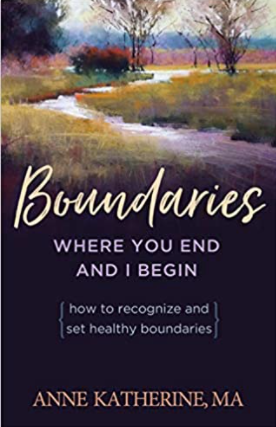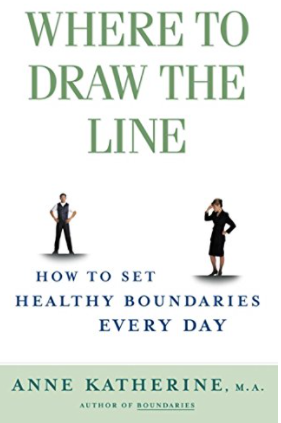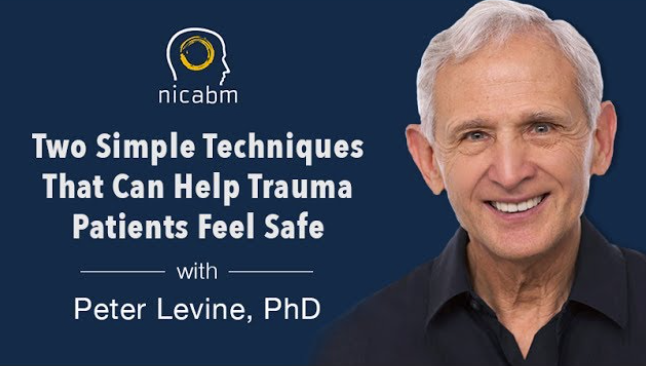Boundaries show where one thing ends and another begins. In a relationship – whether with a family member, friend, partner, or stranger – they’re a way of honouring yourself and what you’re comfortable with. But setting them can be tricky, particularly if you’ve experienced trauma.
Are you comfortable telling people what’s okay for you and what’s not?
Drawing a line in the sand about how you want to be treated and how you’ll react can help you show up more authentically and courageously in life. But if, like many of us, you weren’t taught how to set boundaries, taking ownership of your needs and actions doesn’t always come naturally.
You see, our boundaries are defined during childhood. So, if you grew up in a family with healthy boundaries, letting people know what you need in a relationship, and tuning in to red flags before they become a problem, might come easily. But if you’ve experienced any sort of trauma or simply didn’t see healthy boundaries in practice, understanding and navigating them can be tricky.
That doesn’t mean it can’t be done, though. In fact, lovingly enforcing your personal boundaries can be the most empowering act of self-love you take. And by standing up for yourself, you can teach others about healthy personal boundaries so they can feel empowered too. It’s a win-win.
Here’s a little Boundaries 101 to help you practise your boundary-setting skills.
1. Know your boundaries
No matter what you’ve experienced in your past, you have the right to be seen, heard, and respected. If protecting your needs, values, desires, and beliefs is new to you, knowing the five basic types of boundaries might be helpful.
- Mental. We’re talking freedom of thought. This is your chance to stand up for your views, opinions, beliefs, and values and plan how you will react to others when they express theirs.
- Physical. Close talkers, space invaders, huggers – they’re all prime candidates for breaking personal physical boundaries. Knowing how to set the rules around your personal space can be a dance; think Dirty Dancing circa the 1980s, and you’re the only one who knows what is right for you, so speak up: “This is my dance space, that’s yours.”
- Emotional. Tired of being an emotional dumping ground for your loved one? Feeling ignored by your positive vibes only friend? If you’re feeling anxious or resentful when you’re spending time together, it could be a sign that your boundaries have been crossed, and it’s time to protect them.
- Material. Having limits on how your possessions and things are treated and how you share them is healthy and can prevent you from feeling resentment if your sister “borrows” your clothes without returning them or returns them damaged.
- Time/energetic. Your time and energy are valuable. It’s important to set boundaries around work, home, and social expectations so you can prioritise the things that keep you happy, healthy, and sane.
2. Talk about your boundaries
Healthy boundaries begin and end with you. So the best way to have them met is to talk about them.
Being clear about who you are, what you want, your beliefs, values, and limits helps everyone know where they stand in the relationship. By practising asking for what you want, you’ll also learn more about the people you’re in connection with.
Don’t force yourself to continue if you’re not feeling safe enough to talk about your boundaries. It might mean you’re in an unsafe situation and need some help to get out of it or that you need to slow down a little.
Taking a moment to pause, dropping eye contact, leaving the situation, or moving closer to someone you feel safe with, are physical ways of showing your boundaries when you can’t find the right words.
3. Practice makes progress, especially with boundary setting!
Building boundaries and sticking to them doesn’t happen overnight. Just like any new skill, it can be messy at first. And sometimes, you might not even realise you have a boundary until someone or some event has violated it.
But by noticing moments or relationships that make you feel drained, hemmed in, or attacked, you can start to stand up for yourself and exert your personal power. And that’s where the magic happens.
The more you practice expressing and protecting your values, energy, and thoughts, the more confident you’ll feel setting them. Your new meaningful boundaries will let those close to you know the new rules of engagement for your relationship, and while it might take some time getting used to, your relationship will be better for it.
Boundaries are an essential part of self-care.
Protecting yourself is important. Defining and honouring your personal boundaries is one of the bravest things you can do to take control of your life, but it doesn’t have to be radical.
Start small. Pay attention to people, situations and actions that make you feel uncomfortable and get clear on what needs to change. Safeguard your spaces, learn to say no, and reach out to a therapist if you need more support. You’ve got this.
Want to read more? Here are our top picks on boundaries
Boundaries: Where you end, and I begin – How to recognise and set healthy boundaries
Anne Katherine
An essential guide to setting and respecting boundaries for anyone wanting to understand themselves and others better.
Where to draw the line: How to set healthy boundaries every day
Anne Katherine
Read about the tools and insights needed to create healthy boundaries in every facet of daily life, so you have more time and energy for the things that really matter.
Need some practice knowing where you end?
These body-oriented techniques from Peter Levine can help you find your body boundaries.



